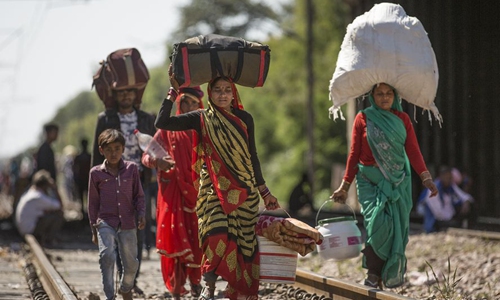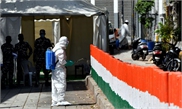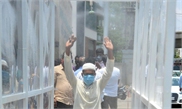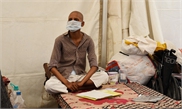
Migrant labourers walk to their villages during the lockdown in New Delhi, India, March 29, 2020. Photo: Xinhua
India, one of the world's most densely populated countries, may have to extend its 21-day lockdown to prevent a major COVID-19 outbreak, although an extension of two more weeks could mean a harder economic blow and a longer road to recovery, experts said.
The South Asian country can't fully copy China's path in balancing work resumption and anti-pandemic efforts, but there's still plenty of cooperation scope for the two neighboring countries, they said.
India will likely extend a strict nationwide lockdown for another two weeks, as the deadly virus has claimed more than 200 lives in the country, according to media reports.
India shut businesses and factories starting on March 24, and more than 1 billion people were asked to follow strict stay-at-home orders. Air, road and rail transport systems were also suspended.
"India may have to make that hard decision no matter whether its economy can take the hit, as its population scale, medical level, and national situation make large-scale outbreaks quite possible," Dai Yonghong, director of the Institute of Bay of Bengal Studies, Shenzhen University, told the Global Times on Monday.
India had confirmed over 8,000 infections and over 200 deaths as of Monday. The true figures are thought to be far higher.
The lockdown, though necessary, is placing even more strain on India's economy, which was already slowing before the outbreak, Dai said.
The industries hit hardest are core sectors such as vehicles, electronics and medical products, according to Dai, and many small and medium-sized enterprises may already face the risk of collapse.
Moreover, experts said that India may find it harder than China to get back to work. For instance, India may find it hard to use technology to track people as China has done, because of a low mobile penetration rate.
India can learn from China by first promoting work resumption in some cities where the virus has already abated, Dai said. China, from the central government to companies, has also been helping the country in its fight against the virus by localizing some of its successful experience.
For instance, China's technology giant Alibaba invested in VMate, an online social platform, which is being used as a crucial way to help people track timely pandemic information. Since the outbreak, VMate has attracted many medical workers, using short videos to popularize the knowledge of epidemic prevention among rural people, read a note from Alibaba.
Chinese smartphone maker Vivo India has donated over 100,000 masks and 5,000 N95 masks to Maharashtra, the city that has been hit hardest by the COVID-19 in the country.
China stands ready to share experience in COVID-19 containment with India and help its neighbor fight the disease, Chinese State Councilor and Foreign Minister Wang Yi said on March 24.
As the only two countries with a population of more than 1 billion, China and India should continue to support each other in combating COVID-19, he said.



